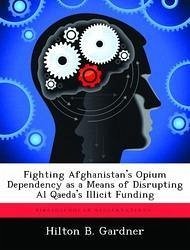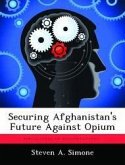Afghanistan supplies 87 percent of the global opium product, and terrorist organizations are using the narcotics trade to fund their operations. The nascent Afghani government has a limited capacity to combat this problem without significant assistance from the US and its coalition partners. This thesis examines the question: Is the current model of interagency counterdrug cooperation sufficient to have an impact on Afghanistan's opium dependency and disrupt one of al Qaeda's main sources of funding? To help answer this question this thesis will review the current coalition, joint and interagency counternarcotics strategy, and in doing so will try to ascertain if there is a more efficient and effective model for interagency coordination as it pertains to counterdrug operations. Finally, this thesis will study the role of special operations forces in counterdrug operations through the historical model of the Latin American counternarcotics strategy and how special forces, in particular, can be used to a greater extent in the counterdrug role in Afghanistan.
Hinweis: Dieser Artikel kann nur an eine deutsche Lieferadresse ausgeliefert werden.
Hinweis: Dieser Artikel kann nur an eine deutsche Lieferadresse ausgeliefert werden.








